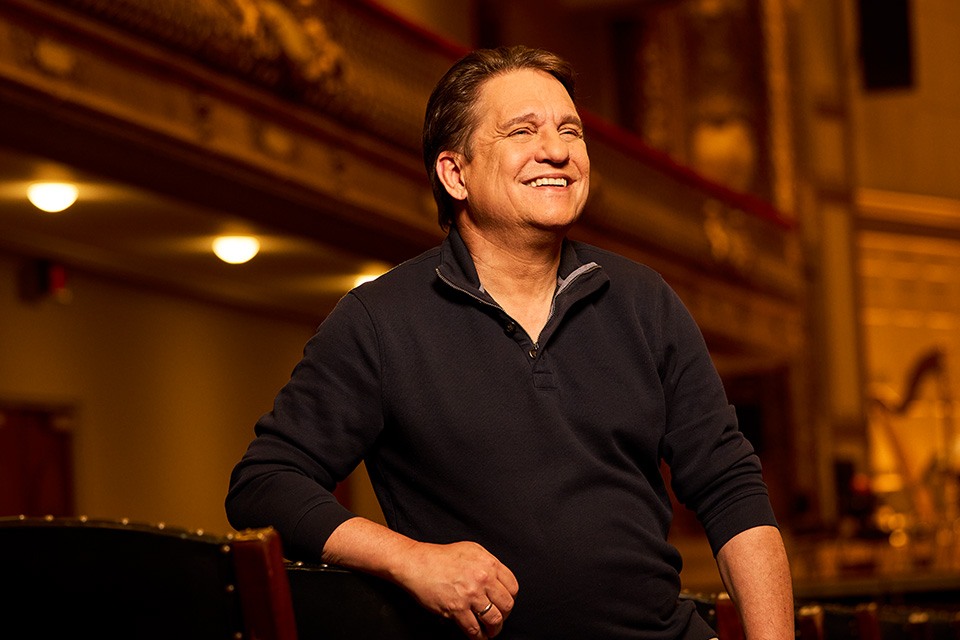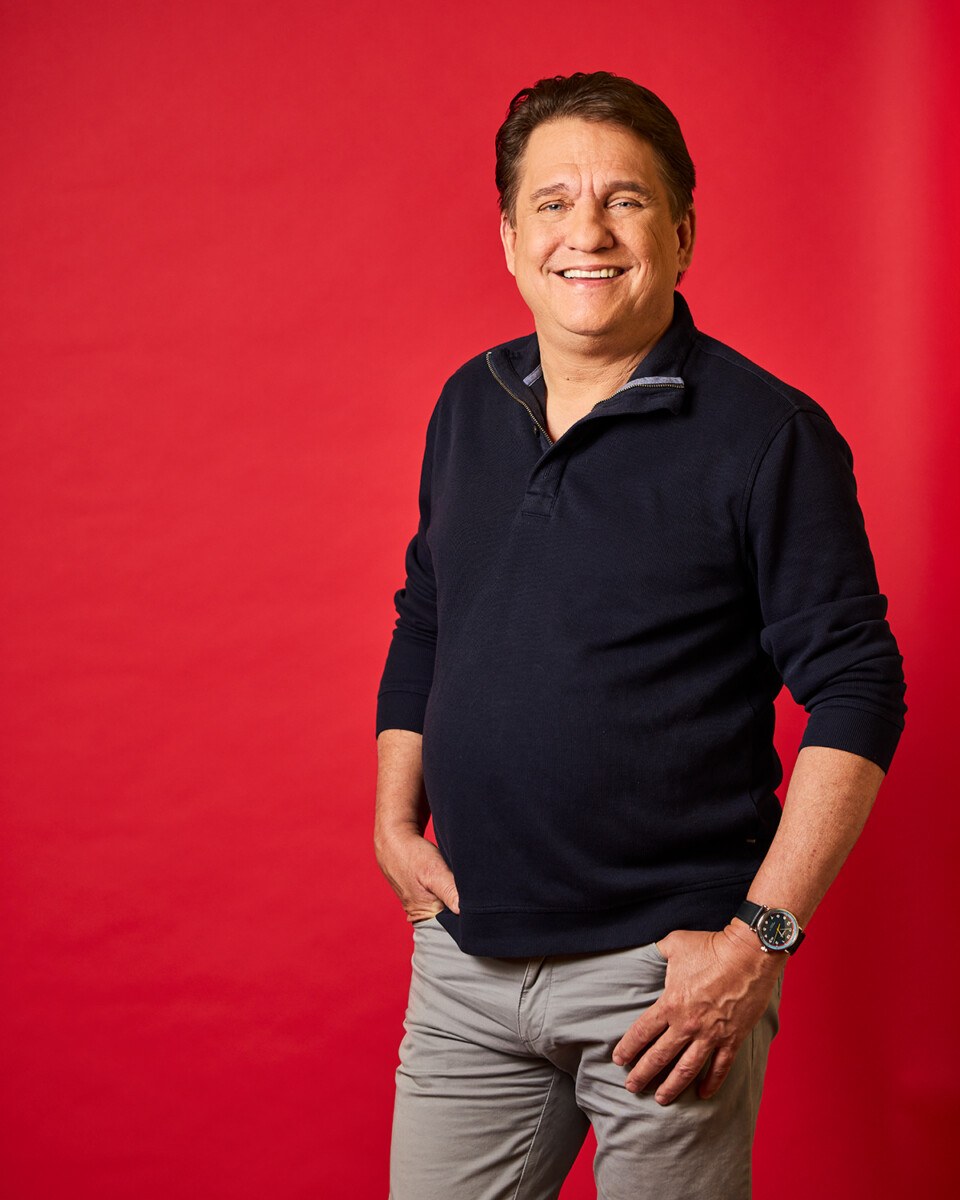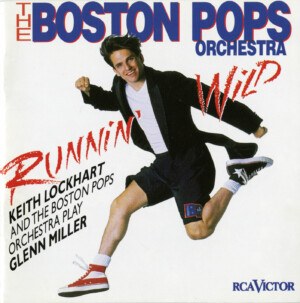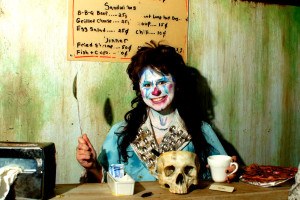Keith Lockhart Is Still Working on His “Death Face” After 30 Years
The conductor celebrates his third decade with the Boston Pops exactly as you'd expect—by throwing a yearlong bash that kicks off this month.

Portrait by Pat Piasecki / Photo by Pat Piasecki
Boston Pops conductor Keith Lockhart has partied with Queen Elizabeth and the royal family, shared the stage with everyone from Steven Tyler to Mayor Michelle Wu, and received two Grammy nominations for his work. Yet if you ask him what people might be most surprised to learn about him, it’s that he’s actually an introvert. “People say, ‘Well, you perform in front of all those people,’ but it’s much easier for me to perform in front of 100,000 people than it is for me to maintain a conversation at a cocktail party,” he says. Lockhart certainly has enough reps under his belt: The maestro will celebrate his 30th anniversary with the Pops when it kicks off its spring season on May 8, with an opening night featuring Wicked star Cynthia Erivo. But before that, we sat down with the second-longest-serving Pops conductor to talk legacies, the physical demands of his job, and his infamous “death face.”
Pretty much the entire cultural landscape. The ways that we consume entertainment, that we consume cultural information, and how information about those things is disseminated. My favorite story for this, which is true, although it makes me sound like an old man, is that when I came to Boston, I didn’t have an email address or a cell phone. And it was not weird that I didn’t have those things. But starting about five years after I got here and continuing today is that live performing arts have been waging a constant battle to remind people, or prove to people, that nothing beats experiencing cultural things in a community. And I think that’s a battle worth fighting.
Are you still making musical discoveries?
Yes! Not with “The Stars and Stripes Forever,” but the interesting thing about the Pops has always been the variety and the lack of constraint as to what is acceptable material. It gives you opportunities. A good example would be last November when we did our Día de Muertos concert. I admit that I was one of the people who said, “This doesn’t sound like a good idea,” not for any disrespect for the holiday or for Mexican culture, but because we’re not known for having a huge Mexican community here, and even if we did, we’re not known for being able to reach into the community and help them find us. But I was wrong on both counts. It was fascinating music, and we featured a couple of local Mexican artists who were outstanding, like an all-female mariachi band. And we had a full house.
What do you listen to in your car or at home?
This is the most boring answer ever. I don’t listen to music in the background. I can’t do it. If it’s soft, I keep trying to hear what it is, and if it’s loud, it honestly just makes my skin crawl. I’m fine with loud music when I’m actually part of the cause. But when I’m in the car by myself, it’s a lot of NPR. You can’t listen to beautiful classical music in the car anyway, because the environment isn’t quiet enough to hear the incredible dynamic range. And when my wife, Emiley, is in the car, it’s a lot of classic rock and Whitney Houston, et cetera.
Do you consider yourself a Bostonian at this point?
Yeah. I don’t know if Bostonians would consider me a Bostonian. I may need to be dead for a while before that happens. But I’ve now lived here almost half of my life, and there’s no other place where I’ve lived longer, even Poughkeepsie, which I left when I was 17. And I’m not scared to drive here, at least not any more than any reasonable human being should be.
Beethoven is the only name carved into the proscenium arch at Symphony Hall because they’ve never been able to agree on who else belongs up there. If they came to you and said, “You get to put another name up there,” whose would it be?
Probably Mahler.
Before Mozart, or Handel, or Haydn, or Bach?
Yeah. I mean, I understand the genius of Mozart, and I deeply appreciate it, but I’m a very romantic guy. The composers who really did the most extraordinary things with orchestra music, which is where I live, are the ones who created soundscapes that were overpowering. Like Mahler said, “A symphony must be like the world. It must contain everything.” That’s just a very different aesthetic than what drove Mozart, and I prefer the really over-the-top, I suppose.
Holiday Pops or Fourth of July on the Esplanade?
Fourth of July is a singular event. It’s like nothing any other orchestra does. But I’ve always been much more of a Christmas person than a Fourth of July person. And I like what we do for people during the holidays. I really get the feeling, and I hope it’s not misguided, that with the 100,000 people we see in that three-week span, we do them some psychological and emotional good. I really love what Holiday Pops has become.

Photo by Pat Piasecki
Worst faux pas or disaster onstage?
I had my pants fall down once, but that was before I was in Boston. I’ve introduced the wrong person before they walked out. But I have a really good selective memory for not remembering mistakes. I’ve certainly started the wrong piece. Most of the mistakes I make onstage, though, I hope are small enough that only the orchestra would notice.
Funniest ad-lib?
It wasn’t intentional, but we had Ted Kennedy and Orrin Hatch on the stage conducting, and I had put them on the stage and they were getting ready to go, and then I went back up to them and reversed them. I said, “No, you’re on the left, and you’re on the right.” There are some opportunities for comedy.
Favorite song in the Great American Songbook?
Jerome Kern’s “All the Things You Are.” “Lush Life” would be another, but it’s a downer.
Anyone you would never work with again, and why?
Yes. The Fourth of July is a one-off, and we tend to have bigger names of the moment than we have at any other time. Their motivation for being there may not be quite the same as some people who are a bit more thoughtful about why they want to work with an orchestra. And during rehearsal, you really get to see what people are like, the best or the worst of them. I won’t name any names, but there are artists who come in and are just delightful. They’re humble. They do exactly what they’re supposed to do. They don’t think it revolves around them. And then you get people who treat everyone badly. Not me, because they’re inclined to be polite to me. But the runners and the people making sure they have towels in their dressing room. If it wasn’t a bad idea, I would punch them.
How physically demanding is conducting?
More than it was 25 years ago. I used to get away without doing a whole lot of exercise because I figured 30 hours on the podium per week made up for it. Now, I need to rethink that. My shoulders hurt more and more. Everything swells up, and the lower back is becoming a bit of a problem. I’ve been sitting more than I ever did. And the worst thing is that I can’t sleep on my left or right side because it starts to hurt, but I can’t sleep on my back, because I snore.
Do you ever get stage fright?
Not as a conductor, but one reason I knew I wasn’t cut out to be a concert pianist was that I had stage fright to the level of panic. I remember getting ready for my senior recital. I couldn’t feel my hands. They were numb and cold, and that’s a bad way to go out. I used to think if I got through a recital, that was surviving, and that brought me no joy. But when I started doing more than dabbling at conducting, I realized it was something that I could do, that I felt very comfortable in the milieu, that I was a better coach than I was a player.
Do you have any superstitions? Anything you reflexively do before going onstage?
Seiji Ozawa used to touch the door frame. Mine are more like routines than superstitions. I get dressed in this order. I take these clothes off first, and these second, and put my pants on one leg at a time. I used to have a couple that were more overt, like a stone in my pocket that meant something to me. But the problem with things like that is that you’re fine until the day you forget the stone.
Your greatest achievement?
Besides my kids? I’m most proud of two things. The work that I’ve done here, and the way that people recognize me as being an elemental part of the arts community in Boston. Also, what I’ve been doing for the past 18 years with the Brevard Music Center Summer Institute and Festival, creating an extraordinary and unique place for kids to learn about music. I’m not John Williams. I don’t have a body of creative work. So it’s nice to know that something you had an elemental part in making may be useful for people 50 years from now.

BSO Archives / Photo via BSO Archives
Do you have a Grammy?
No, I’ve had two Grammy nominations. The problem with the Pops is that it’s put into a category that’s neither fish nor fowl. Arthur Fiedler never got a Grammy, and he sold millions and millions of albums. We have The Celtic Album, which was nominated for best classical crossover. But we lost to Yo-Yo Ma, like everyone does. Then we had a Latin Grammy nomination for best pop instrumental album, for The Latin Album. The award ceremony for the Latin Grammys that year was on September 11, 2001, so that didn’t happen.
Favorite Pops tradition?
I could say it’s Sparkle the Christmas Wonderhorse, who shows up mysteriously during “Sleigh Ride.” Or even the little things, like there’s a place where the brass section and I jump in “The Stars and Stripes Forever.” That was just me screwing around one day, and they started doing it back. And now, when a new generation of trumpet players comes in, the veterans say, “You know, Maestro expects you to do this.”
What do you think an orchestra member would say is your most annoying trait?
Death face. I’m much better about it now than I used to be, but basically, I don’t have as much control over my facial expressions as I should have. When somebody screws up, which inevitably happens because everyone is human and fallible, often, before I can neutralize it, I get the WTF face. I’m fairly sure that’s what the majority would pick as my least attractive trait.
Was your gig at the BBC Concert Orchestra a major career highlight?
It was always very important to me that I not be perceived as just a Pops conductor, because that’s been a burial ground for a whole lot of people. So immediately after I came to Boston, I worked on winning the Utah Symphony job, and I was there for 11 years. Then, when that was winding down, the BBC opportunity came up, like most good opportunities, totally out of the blue. I was just supposed to guest with them, and then they were like, “Hey, would you stick around and be principal conductor?” It was fun because there are a lot of cool things you get to go do just because you’re affiliated with the BBC. I conducted the house orchestra for Queen Elizabeth’s Diamond Jubilee in 2012. I shared the stage with Renee Fleming and Lang Lang and Elton John and Paul McCartney, Stevie Wonder and Tom Jones, Grace Jones and Andrew Lloyd Webber. And then I got to meet the Queen, and we went to a party that was hosted by Harry, William, and Kate.
What’s going to be the title of your memoir?
Well, let me see. The witty ones have been taken: No Minor Chords. The Rest Is Noise. But I can tell you my favorite quote about music from Hector Belioz: “Love or music—which power can uplift man to the sublimest heights? It is a large question, yet it seems to me one should answer it in this way: Love cannot give an idea of music; music can give an idea of love. But why separate them? They are the two wings of the soul.” I’d always wished I’d written that. Maybe that’s the title: I Wish I’d Written That.
By the Numbers
Play That Tune
The Boston Pops have made history and lots of great music since Keith Lockhart took the baton 30 years ago.
2,250+
Number of performances led by Lockhart since 1995.
80
Number of TV shows Lockhart and the Boston Pops have made.
28
Number of U.S. tours the Boston Pops Esplanade Orchestra has taken with Lockhart.
2
Number of times Lockhart and the Pops performed at Carnegie Hall.
1996
Year that Runnin’ Wild rocketed to number one on Billboard’s crossover chart.
20–17
Final score of the 2002 Super Bowl—Pats vs. Rams—for which the Pops performed in the pregame show. It was the first time an orchestra was featured in a Super Bowl and the Pats’ first Super Bowl title.
This article was first published in the print edition of the May 2025 issue with the headline: “Pops and Circumstance.”


